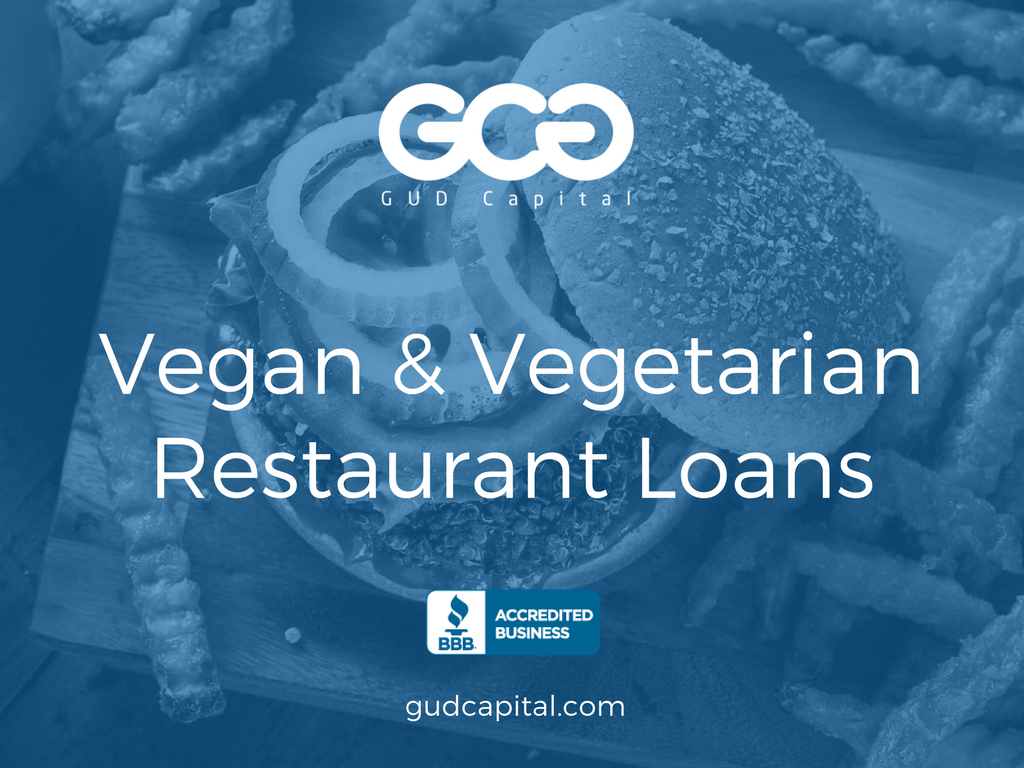Vegan Restaurant Funding
Burgers without meat, cakes without eggs, and cream made with coconut milk are all in fashion and have made their way into the restaurant industry. Hence, within the last few years, the words Vegan and Vegetarian have become familiar terms in the restaurant business; It is no longer novel, but essential for this generation of consumers. Following a plant-based diet once meant being restricted to just fruits and vegetables, but now consist of diverse and delicious alternatives to meat, cheese, and many other non-vegan foods. Moreover, with, more people adopting a vegan or vegetarian diet, the market has undergone growth and innovation that doesn’t seem to be slowing down anytime soon. Thus, the interest in eating more plant foods has resulted from an increasingly health-conscious driven society, and consequently, people have become more selective about what they want to eat and what they can eat. With consumers being more informed about ingredients, plant-based diets, what impact their food choices have on the planet, their health, how foods processed, and the innovation of new food trends crafted by the vegan and vegetarian industry—a shift in the culinary business has begun.
Therefore, ingredients and labels on food products have never been more of a requirement for consumers. Products labeled organic, local, plant-based, gluten-free is especially essential trends in the vegan and vegetarian communities and expect full disclosure on the menus in their restaurants. Thus, organic; meaning a farming system which avoids pesticides, human-made fertilizer’s, livestock feed additives, growth regulators, and the use of genetically modified organisms are critical components in advertising and swaying consumers that demand healthier and more natural options. Locally sourced foods have also become a priority as local ingredients have proven to be both good for the environment—the food travels a much shorter distance, creating a smaller carbon footprint—and it infuses money into the local economy. And the call for gluten-free options; meaning food that is absent from gluten: a protein found in wheat, rye, and barley is also on the radar of consumers. Nonetheless, these ingredients and labels are all a part of the standards and concerns demanded by consumers of plant-based establishments.
Vegan and Vegetarian Food Trends
Because there has been this shift in consciousness from consumers that are more informed about what is in their food, we, in turn, have more knowledge about how our diets impact the environment. Knowing now that the consumption of animal products has a direct adverse effect on the climate, water conservation, ocean (pollution and over-fishing), and deforestation to name a few, consumers have even more motivation and reasons to try plant-based options.
However, with environmental concerns aside, the most popular and exciting food trend comes from the increased variety of meat alternatives now available. These include tofu; made from soybeans that are high in protein and calcium along with another soy meat alternative known as a textured vegetable protein that mainly consists of soy protein isolate—a process that involves separating the protein from the whole soybean have become two of the more common alternatives. We also have seitan and tempeh. Seitan, a processed wheat gluten option that has the most meat-like texture out of all the meat alternatives is also suitable for frying or grilling. Also, lastly, we have tempeh, which is firmer than tofu but has a grainier texture and made from fermented soybeans. Each has been working its way into many plant-based restaurants adding new and familiar flavors and textures to the restaurant industry.
Another popular trend has been vegan cheese and dairy alternatives. At most plant-based restaurants you will find cheeses made from soy protein, solidified vegetable oil (coconut, palm, or safflower), nutritional yeast, pea protein, arrowroot, tapioca flour and natural enzymes to name a few. Plus, companies are even using traditional cheese aging and bacterial culturing methods to keep the vegan cheeses as natural as possible with minimal to know processing resulting in the cheese that requires few ingredients such as nut milk, enzymes, and salt. The vegan market has become more sophisticated and advanced with their ingredients, recipes, and varieties of flavors available and thus have enriched the experience for customers that want vegetable dishes.
But as shown above, there are many reasons why consumers are leaning towards vegan and vegetarian restaurants and why certain trends have come to stay; yet the most alarming and hardest to ignore for consumers is knowing and feeling the adverse effects animal consumption has on their health. Amidst the leading causes of death resulting in eating excess amounts of animal products, plant-based restaurants are becoming more of the norm within the vegan and vegetarian communities and omnivores alike. Thus with heart disease being the number one cause of death in the U.S. along with diabetes, and high blood pressure not too far down the list, eating a more plant-based diet has been met with more acceptance and is growing more and more every year.

Types of Vegan and Vegetarian Restaurant Loans:
Just about every restaurant will seek some form of debt financing at some point in time. Common restaurant loan uses are acquisitions, refinancing debt, consolidating debt, working capital, inventory financing, advertising and marketing, making payroll, paying taxes, and replacing equipment. With over 4,000 lenders available offering 12,000 loan products, it may be difficult trying to decide which product is right for you. Below is a look at the varying conventional and alternative business funding options available to vegan and vegetarian restaurants.
SBA Loans
The Small Business Administration’s 7(a) and SBA 504 lending programs are designed to help small businesses seeking financing for their new or existing vegan or vegetarian restaurant obtain commercial financing when they were unable to secure it through conventional means. The Small Business Administration doesn’t originate the loan but, instead, agrees to cover any SBA lender’s losses should the vegan or vegetarian restaurant default on their loans. SBA financing is used for a variety of uses including: acquisitions, real estate purchases and refinancing, upgrades, repairs, and general working capital.
| Rates | 5-8% |
|---|---|
| Terms | 3-25 years |
| Funding Amounts | $50,000-$5,000,000 |
| Collateral | Required |
| Fees | Medium costs |
Conventional Lending
Getting a loan through a bank (large and small) credit union or community lender is always the preferred form of financing business owners seek. Why? Because traditional lenders offer the lowest rates for vegan and vegetarian business loans, along with the longest terms and lowest fees of all commercial lenders. But these lenders are only able to offer such rates and terms because they aren’t willing to expose themselves to much risk. Therefore, to qualify for conventional financing, you will need to have fantastic credit, good cash-flow, and must show consistent profitability.
| Rates | 5-10% |
|---|---|
| Terms | 1-30 years |
| Funding Amounts | $50,000-$5,000,000 |
| Collateral | Required |
| Fees | Medium costs |
Equipment Leasing
Rather than paying the full-cost, up front, for your vegan or vegetarian restaurant’s equipment, another option could be to simply lease the equipment. When it comes to equipment leasing, a lender will purchase the equipment and then lease it to the restaurant for a period (usually between 1-10 years) with the option to either purchase the equipment at the end of the term, extend the term, or simply return the equipment to the lender.
| Rates | 8-15% |
|---|---|
| Terms | 1-10 years |
| Funding Amounts | $5,000-$5,000,000 |
| Collateral | Required |
| Fees | Medium costs |
Non-Bank Alternative Loans
This type of financing is good for small businesses with good credit and cash-flow, but have been unable to get approved for financing from a bank or SBA lender. Non-bank mid-prime business lenders offer affordable financing without the credit and documentation requirements of conventional lenders. Rates usually range from the high single-digits to the high teens, with terms that range from 2-5 years. This makes a non-bank institutional loan a great option for working capital purposes.
| Rates | 8-25% |
|---|---|
| Terms | 2-5 years |
| Funding Amounts | $50,000-$500,000 |
| Collateral | Not required |
| Fees | Medium costs |
ACH Cash Advances
A cash advance isn’t a loan at all but, instead, involves the sale of the vegan or vegetarian restaurants future bank receivables to a lender (at a discount) in exchange for immediate lump-sum financing. The funding company will analyze the restaurant’s cash-flow in their main operating account, and then provide up to 150% of the restaurant’s monthly average deposits. Repayment is made each business day by having a set amount sent to the funding company from the bank account using Automated Clearing House.
| Factor rates | 1.10 – 1.50 |
|---|---|
| Terms | 3-24 months |
| Funding Amounts | $5,000-$2,000,000 |
| Collateral | Not required |
| Fees | High costs |
MCA Split Advances
Split funding is almost identical to an ACH advance in the sense that it’s a form purchasing future receivables. The main difference between a MCA split and ACH advance is the way the funding company is repaid. As mentioned above, with an ACH advance repayment is made each business day by having a set amount sent to the funding company. With a MCA advance repayment is made by remitting a percentage of the restaurant’s merchant credit card processing sales. This means that each day’s batches are tallied, and a percentage of sales is then sent to the funding company as repayment.
| Factor rates | 1.10 – 1.50 |
|---|---|
| Terms | 3-24 months |
| Funding Amounts | $5,000-$2,000,000 |
| Collateral | Not required |
| Fees | High costs |
Asset Based Financing
This form of financing involves monetizing your restaurant’s balance sheet, or even your own personal equity of hard assets and securities. The most common form of asset based financing collateral for vegan or vegetarian restaurants is their commercial real estate. But, other types of asset based loans for restaurant owners include using personal real estate or your stock portfolio as collateral.
| Rates | 10-30% |
|---|---|
| Terms | 1-3 years |
| Funding Amounts | $5,000-$10,000,000 |
| Collateral | Required |
| Fees | Varying costs |
Summary
As you can see, when it comes to obtaining a loan for a vegan or vegetarian restaurants there are plenty of options available. The key to obtaining the best loan for your business is to learn about all the options available and then shop for the best rates and terms. We understand that finding the right loan may be difficult while also running your business, so if you need help obtaining the best possible financing for your restaurant, please reach-out to one of our commercial financing specialists available 24/7, and we’ll help you navigate the lending process.





















